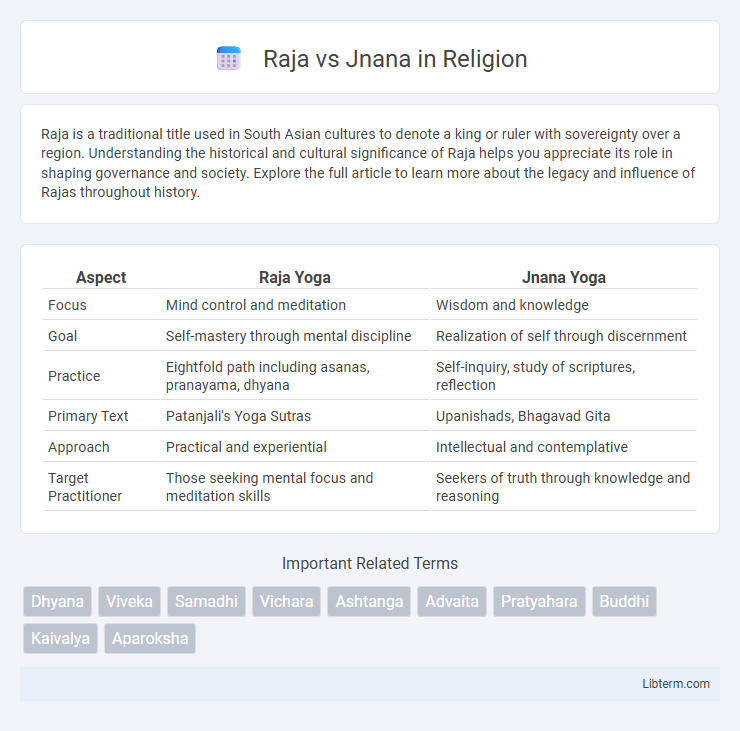Raja is a traditional title used in South Asian cultures to denote a king or ruler with sovereignty over a region. Understanding the historical and cultural significance of Raja helps you appreciate its role in shaping governance and society. Explore the full article to learn more about the legacy and influence of Rajas throughout history.
Table of Comparison
| Aspect | Raja Yoga | Jnana Yoga |
|---|---|---|
| Focus | Mind control and meditation | Wisdom and knowledge |
| Goal | Self-mastery through mental discipline | Realization of self through discernment |
| Practice | Eightfold path including asanas, pranayama, dhyana | Self-inquiry, study of scriptures, reflection |
| Primary Text | Patanjali's Yoga Sutras | Upanishads, Bhagavad Gita |
| Approach | Practical and experiential | Intellectual and contemplative |
| Target Practitioner | Those seeking mental focus and meditation skills | Seekers of truth through knowledge and reasoning |
Understanding Raja Yoga: The Path of Meditation
Raja Yoga, known as the "Royal Path," centers on meditation and mental discipline to achieve self-realization and mastery over the mind. It emphasizes systematic practices such as concentration (Dharana), meditation (Dhyana), and absorption (Samadhi) to cultivate inner peace and spiritual insight. Unlike Jnana Yoga, which relies on intellectual inquiry and knowledge, Raja Yoga prioritizes direct experience through meditation to transcend the ego and attain higher states of consciousness.
Exploring Jnana Yoga: The Path of Knowledge
Jnana Yoga, the path of knowledge, emphasizes self-inquiry and the realization of the ultimate truth through discernment (viveka) and detachment (vairagya). It involves deep meditation on the nature of the self (Atman) and the distinction between the eternal and the transient, aiming to dissolve ignorance (avidya) and achieve spiritual liberation (moksha). Unlike Raja Yoga's focus on physical and mental discipline, Jnana Yoga cultivates wisdom and insight as the primary tools for enlightenment.
Historical Origins of Raja and Jnana Yoga
Raja Yoga, rooted in Patanjali's Yoga Sutras dating back to around 200 BCE, emphasizes meditation and mental discipline as a path to self-realization. Jnana Yoga originates from ancient Upanishadic texts composed between 800 and 200 BCE, focusing on knowledge and wisdom to discern the nature of reality. Both traditions emerged in the context of early Indian spiritual philosophy but prioritize different approaches: Raja Yoga through controlled mind and body, Jnana Yoga through introspective inquiry and intellectual understanding.
Core Philosophies: Raja vs. Jnana Yoga
Raja Yoga emphasizes disciplined physical postures (asanas), breath control (pranayama), and meditation to achieve mastery over the mind and senses, fostering a path toward spiritual liberation through self-discipline and concentration. Jnana Yoga centers on intellectual inquiry, self-inquiry (atma vichara), and the discernment between reality and illusion (maya) to attain knowledge of the true self (Atman) and ultimate reality (Brahman). While Raja Yoga cultivates mental control and experiential insight through practice, Jnana Yoga pursues direct wisdom and realization via profound philosophical understanding and self-awareness.
Key Practices in Raja Yoga
Raja Yoga centers on controlling the mind through meditation, pranayama (breath regulation), and dharana (concentration) to achieve mental clarity and self-mastery. Key practices include Ashtanga Yoga's eight limbs: Yama (ethical restraints), Niyama (self-discipline), Asana (posture), Pranayama (breath control), Pratyahara (withdrawal of senses), Dharana (concentration), Dhyana (meditation), and Samadhi (absorption). These techniques contrast with Jnana Yoga, which emphasizes knowledge, inquiry, and discernment to realize the self.
Essential Techniques of Jnana Yoga
Jnana Yoga centers on self-inquiry and discrimination (viveka) to distinguish the eternal self (Atman) from the transient material world. Essential techniques include shravana (listening to sacred texts), manana (reflective meditation), and nididhyasana (deep contemplation) to internalize and realize the truth of non-duality (Advaita). Mastery of these practices leads to liberation (moksha) by dissolving ignorance (avidya) and revealing the unity of individual consciousness with universal Brahman.
Goals and Outcomes: Self-Realization Compared
Raja Yoga emphasizes disciplined physical postures and meditation to achieve mastery over the mind, leading toward self-realization through concentrated mental control and inner stillness. Jnana Yoga seeks self-realization by cultivating wisdom and knowledge, using deep inquiry and discernment to dissolve ignorance and realize the true nature of the self. Both paths aim for enlightenment, yet Raja Yoga focuses on harnessing mental and physical faculties, while Jnana Yoga targets intellectual understanding and direct insight into ultimate reality.
Similarities Between Raja and Jnana Yoga
Raja Yoga and Jnana Yoga both aim to achieve self-realization and liberation (moksha) through disciplined mental practices and profound inner awareness. Both paths emphasize detachment from the ego and sensory distractions to attain higher states of consciousness and spiritual wisdom. Meditation and self-inquiry are fundamental techniques shared by these yogas, facilitating deep introspection and the dissolution of ignorance (avidya).
Differences in Approach: Mind, Intellect, and Experience
Raja Yoga emphasizes control and discipline of the mind through practices like meditation and breath regulation, aiming to achieve mental stillness and self-mastery. Jnana Yoga centers on the use of intellect and discernment to realize the nature of the self by questioning, analyzing, and understanding reality. While Raja Yoga relies on experiential techniques to calm mental fluctuations, Jnana Yoga engages the cognitive faculty to attain knowledge and insight into the ultimate truth.
Choosing Your Path: Which Yoga Suits You?
Raja Yoga emphasizes mastery of the mind through meditation and disciplined practice, making it ideal for individuals seeking mental clarity and self-control. Jnana Yoga centers on the pursuit of knowledge and self-inquiry, appealing to those who prefer intellectual exploration and philosophical understanding. Selecting the right path depends on whether you are drawn to meditative concentration or analytical reflection in your spiritual journey.
Raja Infographic

 libterm.com
libterm.com